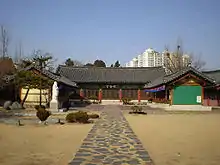Daegu Hyanggyo
The Daegu Hyanggyo (a hyanggyo is a state-sponsored academy where students studied Confucianism and prepared for the gwageo, civil service examinations during the Goryeo Dynasty, 918-1392, and Joseon Dynasty, 1392 - 1910) was founded in 1398 during the reign Joseon Dynasty King Taejo.

History
During the Second Japanese Invasion in 1592 it was completely burned down. In 1599 the Daegu Hyanggyo was rebuilt near Dalseong Park but was relocated to the original 1398 site of Dalseong Park in 1605[1] and then back to the Gyodong area again. 1932 saw the hyanggyo again relocated to its present location in Namsandong, just south of downtown Daegu.[2] In 1973 Hyanggyo at Daegu underwent a full restoration.[3]
Buildings
There are two main buildings in the hyanggyo, Myeongyundang, the lecture hall and Daeseongjeon, the Confucian shrine hall.[4] The original traditional layout of a hyanggyo has the Daeseongjeon located in front of Myeongnyundang as it was when first built. Today the layout finds the Daeseongjeon centered in the north, facing the wide courtyard, with the Myeongnyundang found to the right of Daeseongjeon when entering.
Memorial tablets
Daeseongjeon houses memorial tablets where every year in the 2nd and 8th lunar month a ritual called Seokjeon-daejae is conducted honoring Confucius and famous Confucian scholars of Daegu.
Current Use
Myeongnyundang now serves as a classroom where lectures and lesson on old Chinese characters and traditional Korean etiquette is taught. On weekends and holidays traditional Korean weddings are held at garden on the complex grounds.[1]
Daeseongjeon is designated as City of Daegu Local Cultural Material #1.[2]
Gallery
 Daeseongjeon (shrine hall) City of Daegu Local Cultural Material #1
Daeseongjeon (shrine hall) City of Daegu Local Cultural Material #1 One of the auxiliary halls on the hyanggyo grounds
One of the auxiliary halls on the hyanggyo grounds Statue of Confucius on complex grounds
Statue of Confucius on complex grounds Classes in Myeongryeondang
Classes in Myeongryeondang
References
- "Archived copy". Archived from the original on 2009-12-20. Retrieved 2012-01-07.CS1 maint: archived copy as title (link)
- http://english.daegu.go.kr/Tourism/Tour/view.asp?table=dg_Tour&item_no=175&tour_cat_id=1&tour_subcat_id=6
- orientalarchitecture.com. "Asian Historical Architecture: A Photographic Survey". www.orientalarchitecture.com.
- "Archived copy". Archived from the original on 2012-02-29. Retrieved 2012-01-07.CS1 maint: archived copy as title (link)
| Wikimedia Commons has media related to Daegu hyanggyo. |